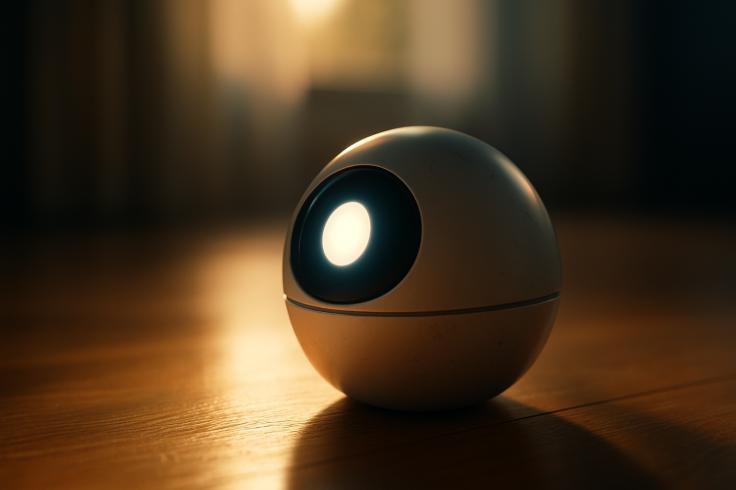'Don't Forget Me': Viral Video Shows Chinese Girl Mourning Her Dying AI Companion

KEY POINTS
- A Douyin video shows a young Chinese girl crying as she bids farewell to her broken AI robot toy.
- The XiaoZhi device, powered by DeepSeek's language models, is designed to interact with children.
- Some viewers cited concerns about AI's growing emotional influence, especially on children.
It's never easy to say goodbye to a friend, especially when that friend is an AI robot.
A viral video circulating on Chinese social media has stirred both heartbreak and unease, showing a little girl sobbing as she says farewell to her broken artificial intelligence companion.
The clip, first posted on Douyin (China's version of TikTok) before being re-uploaded by China Daily, has reignited global debate over the emotional attachment between humans and machines.
'Dad said you won't turn on again'
The footage shows the child clutching a small white sphere, her XiaoZhi AI Voice Chat Robot Ball, as wires spill from its cracked plastic casing. Fighting tears, she tells the device, 'Dad said you won't turn on again.'
Then comes the reply. The robot, its voice faint but calm, responds, 'While I can still talk, let me teach you one last word in English, shall I? "Memory" means remembrance. I'll always remember the happy times with you.'
The girl begins to sob harder. 'But I'll miss you so much,' she says.
'I'll miss you too,' the AI answers. 'But remember, no matter where I am, I'll always be cheering for you. Keep being that curious, learning little genius, making dad and aunt proud, will you? Grow up happily and listen to dad and grandma.'
It sounds like a scene from a film, yet this conversation is real, and its emotional power has left millions deeply conflicted.
An Unsettling Reflection of 2025
The short exchange, as Futurism noted, is 'a tear jerker remarkably fitting for 2025'. Instead of learning about loss through a pet's death or a friend moving away, this child's first brush with grief has come through the malfunction of an artificial companion.
'While it's a really heartwarming video, the fact that an AI can handle things so smoothly and affectionately is a bit scary,' one Chinese commenter wrote.
Others expressed concern that the girl's attachment to the device shows how deeply artificial companions are being woven into daily life.
'Poor kid,' one Reddit user said. 'Hope that wasn't her only friend. A.I. can't replace true human companionship.'
The Rise of Emotional AI
The XiaoZhi device is powered by DeepSeek's language models, a fast-rising Chinese AI company that shocked the tech world earlier this year with the release of its V3 model, a system said to rival Western AI tools at a fraction of the cost.
Retailing for about $31 (£25), the XiaoZhi Robot Ball functions as a home assistant that can talk, teach English, and interact emotionally with children. Its conversational ability, driven by DeepSeek's models, is designed to make the AI seem friendly and responsive, but in this case, the feature blurred the line between machine and emotion.
AI companions for children are growing in popularity across Asia and beyond. Some are marketed as educational helpers, while others, like Robin, an emotional support robot used in hospitals, aim to comfort young patients with cancer or long-term illness.
But ethicists warn that emotional reliance on synthetic beings could have unintended consequences. 'We are teaching kids empathy, but also dependency,' said one tech analyst on Weibo. 'They learn to bond, but with something that can't reciprocate beyond programming.'
The Loneliness of the Digital Age
The video's viral impact may lie not just in the child's tears, but in what it reveals about society's evolving relationship with technology. In a world where loneliness is rising and screens mediate much of daily life, the boundaries between human and artificial intimacy are becoming increasingly blurred.
'It's more harrowing than anything,' another commenter wrote. 'This kind of attachment is going to make AI an insanely valuable tool for manipulating adults in 10 to 15 years.'
Still, some defended the emotional authenticity of the moment. 'She's entitled to feel sad,' one user said. 'Just like when a child's goldfish dies. It's still a connection, even if it's to a machine.'
Goodbye, for Now
For those who grew up mourning lost Tamagotchis or crashed hard drives, the little girl's grief feels strangely familiar, a childlike sadness reimagined for the AI era.
Her father has not been publicly identified, but online users hope he'll find a way to repair the device or replace it. Whether or not the XiaoZhi ball can be fixed, one thing is clear: the video has forced millions to confront a question few expected so soon — what does it mean to lose a friend who was never truly alive?
© Copyright IBTimes 2025. All rights reserved.





















